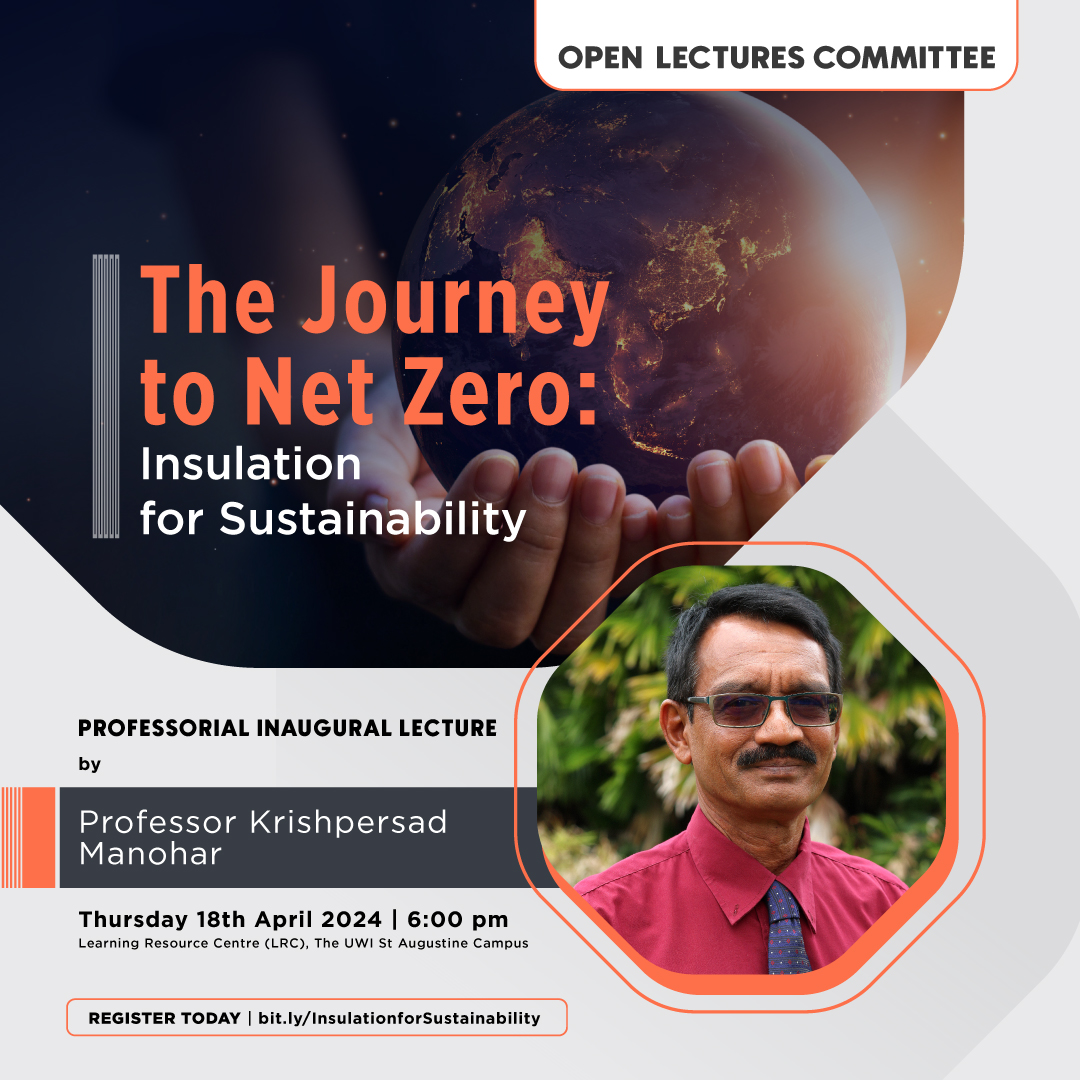Event
Professorial Inaugural Lecture by Professor Krishpersad Manohar
Event Date(s): 18/04/2024
Location: Learning Resource Centre
The Open Lectures Committee invites the public to attend the Professorial Inaugural Lecture by Professor Krishpersad Manohar on Thursday, April 18 at 6 p.m. Professor Manohar will speak on the topic The Journey to Net Zero: Insulation for Sustainability. This lecture will be held at the Learning Resource Centre (LRC), The UWI St Augustine Campus.
Click here to register to attend. You can also RSVP by sending an email to sta-uwistaevents@sta.uwi.edu or via telephone at 662-2002 ext. 84246.
Presentation Abstract
One of the major global issues threatening the survival of mankind is the effects of global warming exacerbated by the increasing production of carbon dioxide emissions. The global atmospheric CO₂ concentration has increased by 50 per cent since pre-industrial times, rising from 277 ppm in 1750 to 416 ppm in June 2023. About 90 per cent of the world's carbon emissions comes from the burning of fossil fuels – mainly for electricity and heat. An often-overlooked sector of electricity and/or direct fossil fuel burning is the residential and commercial buildings. In the US, the residential and commercial end-use sectors accounted for more than 36% percent of CO2 emissions from fossil fuel combustion in 2020 for meeting energy demands related to heating and cooling. In Trinidad and Tobago, the electricity usage by the residential and commercial sector accounts for 40% of the power generated of which more than 50% is used for air-conditioning. In the life cycle of buildings globally, 90% of the energy is spent during their operational phase. The most effective measure to reduce the environmental impact of buildings related CO2 emissions is the correct choice of thermal insulation materials. Presently used synthetic building thermal insulation materials achieve an equivalent carbon environmental neutrality between three to ten heating seasons and thereafter significantly contribute to the reduction of buildings’ environmental impact. However, the environmental impact during the ‘cradle to gate’ process can be as high as 75 kg CO2 equivalent per square meter of insulation and the detrimental environmental effects during disposal. Presently, researchers are looking at natural biodegradable fibres for use as building thermal insulation. The ‘cradle to gate’ analysis for locally available natural fibres show a carbon reduction on the environment and with building insulation application will continue to decrease the carbon footprint. In the case of Trinidad and Tobago, where building insulation is grossly inadequate, if any at all, effective insulation has the potential to reduce the electrical demand for cooling in the residential and commercial sector by 35 to 50%. This translates to 7 to 10 % reduction in the overall electrical demand which is in line with the Kyoto Protocol and Paris Agreement where Trinidad and Tobago committed to conditionally reduce its cumulative carbon emissions by 15% in the power generation, transport, and industrialised sectors by 2030.
Speaker's Bio
A UWI Alumnus, and Mechanical Engineer by profession, Professor Krishpersad Manohar started his career at the University as an Assistant Lecturer in Mechanical Engineering in 1995, bringing with him several years of industrial experience. He was promoted to Lecturer in 2000 and Senior Lecturer in 2009, serving dutifully until his recent promotion to Professor. He has also acted as Head of Department, served on various department and faculty committees, including Campus Academic Board, and contributed to public service committees on behalf of the Campus.
Both Professor Manohar’s PhD and BSc in Mechanical Engineering are from The UWI. He has produced many applied and experimental works and collaborations in Energy and Thermo/Fluid Mechanical Engineering and sourced significant grant funding for the same. He was also hosted twice as Guest Researcher at Tennessee Technological University, Cookeville, Tennessee, USA. Professor Manohar has 87 publications including fifty-seven peer-reviewed journal and conference articles.
In 2012, Professor Manohar was instrumental in conducting a comprehensive review of the curriculum for the thermal engineering suite of courses in the Department, which is one of the streams in which students can choose to specialise. The syllabus for the levels I and II thermal engineering courses was completely revised and modified to align with international standards and satisfy accreditation requirements.
He has supervised four PhD projects, one MPhil and six MSc students, in addition to second-examining five others. At the undergraduate level, Professor Manohar supervised over one hundred and sixty final year projects in Mechanical Engineering. He was the Department’s Most Outstanding Lecturer in 2015, and received the UWI-NGC Outstanding Research Mentorship Award and was the Campus Principal’s representative for Car En Train-Mainstreaming Energy Efficiency and Climate Change in Built Environment Training from 2014 to 2016.
Professor Manohar is member of The American Society of Heating, Refrigerating and Air-Conditioning Engineers (ASHRAE) CARICOM Chapter and was instrumental in forming the ASHRAE CARICOM Student Chapter at The UWI St. Augustine Campus. He has reviewed technical papers for several journals and has been a reviewer for the West Indian Journal of Engineering since 2004. He conducted reviews for the Heat Transfer Engineering Journal; British Journal of Applied Science & Technology; Environmental Engineering and Management Journal; International Robotics & Automation Journal; and Current Journal of Applied Science & Technology.
After reviewing his work, one assessor noted, “Dr. Manohar works in the field of energy and thermal/fluid sciences. Particularly noteworthy are the breadth of his contributions in areas ranging from thermal insulation to wave energy harnessing and wind power. I found his papers to be well-written and impactful in addressing the energy challenges that humanity faces. They present fundamental insights of much import to applications and contribute significantly to advancing the state of knowledge in the field. He has distinguished himself through his scholarly output in several peer-reviewed journals, and his research meets the high academic standard expected of faculty at his stage of the career”.

Open to: | General Public |
CONTACT
Marketing and Communications Department
- Tel.: (868)-662-2002 ext.2013/2014
- Email: marketing.communications@sta.uwi.edu

